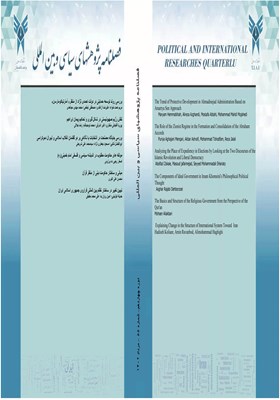مبانی و ساختار حکومت دینی از منظر قرآن
محورهای موضوعی : مجله پژوهش های سیاسی و بین المللی
1 - عضو هیات علمی دانشگاه آزاد اسلامی تاکستان. ایران
کلید واژه: خدا, قانون, حکومت, مالکیت,
چکیده مقاله :
با پیروزی انقلاب اسلامی ایران حکومت دینی مطرح شد دراین تحقیق با روش توصیفی ،تحلیلی بر اساس آموزه های دین اسلام مبانی و ساختار حکومت دینی ترسیم شده است در تعاریف ارائه شده از حکومت، سه وظیفه وضع قانون ،اجرای ونظارت به عهده حکومت می باشد در واقع حکومت نوعی تصرف درثروت و منابع و حتی تصرف در جان ، و سرنوشت انسانهاست و لازمه ی تصرف در هر چیزی داشتن مالکیت است. براساس آیات قرآن کریم ،خداوند خالق عالم و مالک آن است و مالکیت انسان، مالکیتی اعتباری است حتی نسبت به جان خود نیز مالکیت حقیقی و مطلق ندارد و تصرفاتش نیز مشروط به اذن الهیست نتیجه این که حاکم همان خالق است که در این حکومت، قانون گذار خداست و مجری حکومت منصوب اوست و با پذیرش مردم حاکمیت خدا تحقق پیدا می کند. واژههای کلیدی: 1- خدا 2- حکومت 3- مالکیت 4- قانون 5- مجری
Following the victory of the Islamic Revolution in Iran, theocracy was introduced. In this research, using the descriptive-analytical method, and the ideas of Islam, the foundations and structure of the religious government are illustrated. In the definitions of government, law making, supervision and implementation are considered as government’s responsibilities. Government requires possession of the wealth of a land and possession of the lives, property and destiny of humans, and possession of anything requires its ownership. According to the Holy Qur'an, God is the creator and owner of the world and human ownership is a credit ownership, as humans do not even have real and absolute ownership over their lives and properties, and their possessions are subject to God's permission. Therefore, God is the ruler and the lawmaker who appoints the executive of the government, which eventually gains recognition by the people.Keywords: God, Government, Possession, Law
_||_

